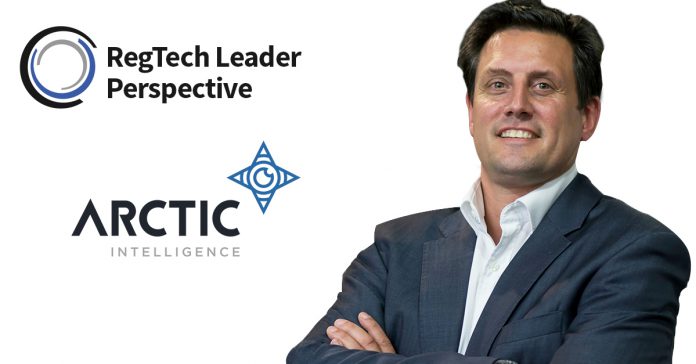Financial criminals are winning, so organisations need to be more vigilant and work together to combat it, according to Anthony Quinn, founder and CEO at Arctic Intelligence.
One of the biggest challenges facing financial institutions is combatting financial crime, particularly money laundering. There has been a lot of focus put on anti-money laundering (AML) and clamping down on the threats posed by financial criminals. Earlier in the year, the 5th Anti Money Laundering Directive was launched to put tighter restrictions around electronic money and making anonymous payments.
Just this week, it was reported by Reuters that the European Union governments had reached a preliminary deal to boost efforts in countering money laundering. Plans allegedly are to give the European Banking Authority (EBA) the ability to force national supervisors to investigate any alleged breaches of the AML regulation.
The issue is, financial criminals are constantly adapting their attacks and are now ‘more nimble and sophisticated than ever.’ It’s hard for financial institutions to keep up with all the different attacks from multiple sources when they target weak points or vulnerabilities, especially as these can be caused without the institution being aware and are even harder to spot.
Anthony Quinn said, “From a financial crime perspective, the threats from organised crime networks and cyber criminals are constantly evolving as fraud, money laundering and tax evasion schemes become more complex. We have seen banks fined USD$400bn for non-compliance with financial crime laws and we have seen a rise in the board accountability regimes that increases the personal threat to executives for not doing enough to stop financial crime. Yet in spite of all this we continue to hear about major financial crime issues, such as the USD$230 billion that has been laundered through Danske bank.”
Fines are still being implemented across the industry for AML failures, with the Prudential Authority of the South African Reserve Bank fining HSBC Bank R 15m ($1m) for failures in AML and CTF earlier this month. While the sanctions were not imposed due to having been found of facilitating transactions involving money laundering or financing terrorism, it was due to weaknesses which had the potential to see these crimes to succeed.
Quinn said, “Organisations need to be ever vigilant and work much more collaboratively to combat financial crime. The historic unwillingness of inability to share information about bad actors means that criminals that are prevented from opening accounts or engaging in transactions with one institution can just walk down the road and get started elsewhere so organisations need to get much smarter at how they combat these threats.”
In the current market the criminals are winning with fraud, tax evasion, money laundering and human trafficking accounting for around $1.45trn of which one per cent is ever redeemed, Quinn stated. This is why it is becoming increasingly important for financial institutions to adopt RegTech solutions and bolster their protections against criminals.
Arctic Intelligence develops audit, risk and compliance services to manage key aspects of financial crime compliance programs. Its cloud-based AML Accelerate solution conducts money laundering and terrorism financing risk assessments tailored to over 30 financial and non-financial sectors. The solution begins with the client answering some questions, and after this they are put through a step-by-step process to meet AML compliance needs. This includes compiling the risk assessment, providing a AML program manual, collecting and completing KYC requirements, deploying a simple operational guide, and then delivering ongoing notifications on any AML regulatory changes.
RegTech solutions, like Arctic, are building a range of solution types to meet the evolving needs of banks, not just for changes in regulation, but in changes to how criminals are attacking a business. KYC tools, AI-powered transaction monitoring and machine learning tools, are just some of the ways in which companies are using technology to combat fraud.
Every institution is different and there is no correct way of getting a solution in place. It all depends on what feels best for an institution on if they decide to acquire a solution, partner with a platform or create it by themselves. There are upsides and downsides for each of these routes, but one thing RegTechs can offer is solutions implemented quicker. Quinn also believes that a lot of the solutions in the market might not have been possible without the work of RegTechs and their innovation.
“RegTech solution providers have deeply thought about the problem and purposefully designed solutions (often in collaboration with multiple financial institutions, regulators and professional services firms) and as a result can often offer far better capabilities at a more cost-effective manner than in-house developed solutions or legacy and dated technology providers.”
AML and KYC solutions have clearly been a hot topic in the world of investing. Companies developing solutions for these regulations have received the lion share of funding since 2014, according to data from RegTech Analyst. Of the total $6.1bn to be invested into the RegTech space between 2014 and H1 2018, 35.1 per cent went to companies building KYC solutions, and 29 per cent went to those developing AML tools.
The reason technology has become so intertwined with solving financial crime is its ability to make sense of complex structured and unstructured data, Quinn said. Before, data was often spread across multiple locations and it was much harder to truly use it efficiently, but with AI, machine learning and data lakes, it is much easier to build insights and keep track of the whole organisation and operations. This then helps to build better images of cyberattacks and single out anomalies or patterns.
Moving forward
With so much capital going into the RegTech space and there being an increased level of regulations, which are constantly evolving or being entered into the market, it’s only natural for there to be a lot of new entrants into the market. This can put a lot of strain on the market, as there is more competition and its easier for financial institutions to choose between offers, but it also means it can be hard to find the right solution.
The best way to address this is for financial institutions to be clear in what they need and the specific services that they require. But this also relates to RegTechs, as it is hard to search through the whole market and find the best vendor. RegTechs need to become clearer in what they offer and why it’s important.
“I think it is important for RegTechs to get better at explaining their value across the compliance value chain and to identify opportunities to partner and collaborate with each other to present more holistic solutions where the “sum of the parts” is more attractive to financial institutions than multiple “point solutions.”
The real onus is not on anyone in particular, both sides of the industry need to be working together, rather than against. Startups need to be ‘bank ready’ and know where they should engage with a large organisation and ensure that implementation would be a smooth process. However, Quinn believes that financial institutions need to reciprocate and implement “simpler ways to engage, experiment and interact with smaller companies and make the procurement process simpler and quicker.”
The sector is continuing to grow, with the first three quarters of 2018 already reaching record levels of funding, RegTech Analyst data shows. Compared to last year, there has nearly been double the capital volume to be deployed, with 2017 seeing $1.8bn invested and Q1 – Q3 2018 having $3.7bn injected into the space. Going forward into the future, Quinn feels that more companies will partner together to build a wholistic approach.
“I think there will be lots of convergence. There are many RegTechs solving parts of the financial crime problem and no holistic provider that offers a one-stop-shop end to end solution so personally I think over the next 3 years we will see lots of collaborations, acquisitions and integration of technology capabilities to provide more end-to-end platforms, exciting times if you are in this space.”
Copyright © 2018 RegTech Analyst
Copyright © 2018 RegTech Analyst






